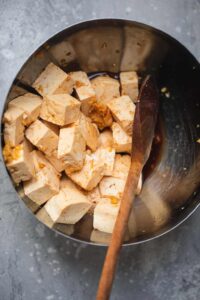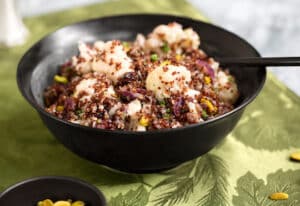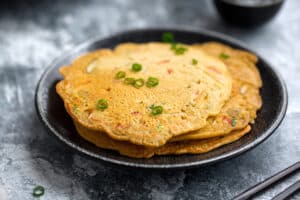Evoking nostalgic images or roasting on an open fire, chestnuts are one of the winter’s most delightful seasonal traditions. Their slightly sweet, soft, and mealy meat is a departure from the usual crunch of nuts.
Chestnuts are highly perishable and must be kept refrigerated. When kept at room temperature, they will start to go bad after just a few days; much longer than that, they will become moldy in the shell. Refrigeration will extend their life considerably; kept in ventilated plastic bags, they will remain fresh for 2 months. Choose firm, shiny-looking chestnuts during their fall and early winter season.
Because they are 50 percent water and 42 percent starch, chestnuts are not as dense in nutrients as other nuts. They are a mere 1.5 percent fat, and only 3 percent protein. A cup of chestnuts contains about 300 calories. They contain moderate amounts of vitamin A, several B vitamins, and the minerals iron, potassium, and phosphorus.
To prepare chestnuts for use, it’s easiest to bake them. Cut an X into the domed part of the chestnut with a sharp knife. Arrange, cut side up, on baking sheets or in baking pans and cover with aluminum foil. Bake at 350 degrees F for 40 to 50 minutes, depending on their size and how much of a roasted flavor you desire. Remove the foil and cool them until they can be handled. Shell while still warm, when they are easiest to peel, and eat as a snack or reserve for use in cooking.
- Sauté chopped roasted chestnuts in olive oil or nut oil for 5 to 7 minutes and use as a side dish.
- For an unusual salad, combine a cup or so of chopped roasted chestnuts with equal amounts of watercress and finely shredded red cabbage. Add tender lettuce (such as Boston or Bibb) as needed, depending on how many you are serving. Dress with good olive oil and red wine vinegar.
- Perhaps the most common use for chestnuts in cooking is as an element in stuffings.
Here's a recipe for Roasted Chesnuts
- For lots more features on healthy lifestyle, explore VegKitchen’s Healthy Vegan Kitchen page.
- Here are more of VegKitchen’s Natural Food Guides.






Comments
No Comments